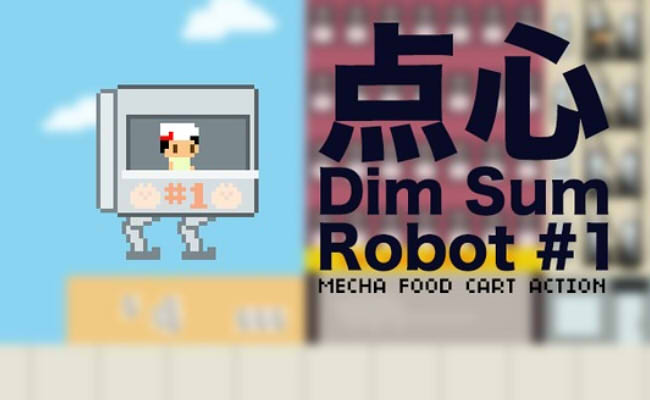Dim Sum Robot #1 is a small game similar to Tiny Tower and Game Dev Story that simulates a business environment on a small-scale level. Made by New York developer Edward Dixon, this game already has many of its features complete, so the PC version is already slated for release. The Kickstarter budget is intended to spread the game’s platform from purely PC to mobile versions on the iPad, iPhone, and Android tablet devices. The game asks for just $1000 and is already over halfway to its goal—but it only has ten days left for funding.
Dim Sum Robot #1 has very few mechanics, but they pull together well. Your goal is to sell food to customers as fast and efficiently as possible, moving your mecha food stand to where the crowds are and collecting extra ingredients from people in the buildings behind you. Although it’s considered a platformer, there are very few obstacles to overcome. The preview just shows you moving around your giant mecha food table to crowds and to a singular person in a building—nothing is really challenging you, nor is anyone afraid of your giant machine. Still, the game holds together well.
Unlike many of the other games on Kickstarter, Dim Sum Robot is not complicated and features no amazing features or new controls. Instead, it focuses on the small bits that make the game fun: platforming with your mobile robot, giving out food to customers, planning chain combos, finding supplies, and receiving tips. There is no plot tangled up in the game, and no noticeable goal. Perhaps some upgrades or expansions as you earn more money would spice up the game, but as it is, it is very basic in its approach.
That’s not to say it won’t be fun. Similar games, such as Tiny Tower and Game Dev Story, are all about managing supplies and planning goals for your simulated people. Anyone who’s played them knows that even with its simple mechanics, their never-ending premise keeps you playing constantly. If this game proves to be similar, it could easily become addicting—even more so than its predecessors, since moving your mecha around demands active involvement in the game. Seeing what kind of new mechanics the creator thinks up for the full game will be very interesting to watch.
As it stands, the game is already at 70% coding completion and only needs $300 to make its funding goal. The project itself has spent years in development and its creator is finally trying to see it to completion. Its donator tiers are somewhat low, though one allows you to become a character (either a customer or competitor) for only $25. Before you go picking competitor, remember that you see way more customers in the game than competitors (presumably). While the game might be small, it looks incredibly fun to play, and with added bonuses such as upgrades or platforming obstacles, it could easily become an addictive mobile game to occupy your time. If you’re interested in supporting Dim Sum Robot #1, be sure to visit its campaign page and donate.


0 Comments